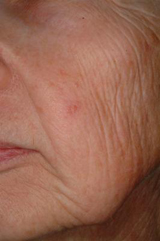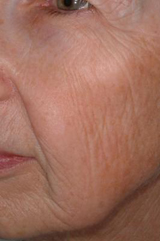 Laser rejuvenation is highly effective for improving the appearance of aging skin. It has become one of the most popular cosmetic procedures.
Laser rejuvenation is highly effective for improving the appearance of aging skin. It has become one of the most popular cosmetic procedures.
Laser rejuvenation uses newer “non-ablative” lasers that trigger the growth of collagen in the deep layers of the skin. The resulting collagen growth leads to fuller, more youthful appearing skin with an improved glow and texture.
Laser rejuvenation is performed safely in the doctor’s office and requires almost no recovery time (no "downtime"). It is an effective alternative to more intensive procedures, such as facelifts or deep chemical peels.
Laser rejuvenation differs from laser resurfacing that uses "ablative" lasers that act on the upper layers of the skin and require more recovery time.
Laser rejuvenation can be used to reduce the signs of aging and sun damage, including fine wrinkles, superficial acne scars, enlarged pores, freckles and uneven pigmentation, as well as the redness and dilated capillaries (telangiectasias) associated with rosacea.
Because a beam of laser light is so focused, doctors can be very precise in treating affect ed skin while leaving surrounding skin intact.
ed skin while leaving surrounding skin intact.
During laser rejuvenation, the entire face is treated in a 30 to 90-minute procedure.
What to Expect from Laser Resurfacing
You should notice improvement after the first treatment. For optimal results, the treatment is usually repeated about every four weeks for a total of 4–6 treatments. After the sixth treatment, fine wrinkles, darkened spots, and even superficial scars are noticeably improved.
Laser treatment doesn’t carry many side effects or risks, but the procedure does require a short healing time afterward. During this time, you may be prescribed antibiotics to ward off possible infections. Your doctor will likely apply a special dressing to the affected skin to be worn for several days to protect your skin and aid in healing. Once the dressing is removed, use gentle cleansers and ointments to keep the skin from drying.
Possible side effects from laser skin rejuvenation include swelling, which goes away in a few days, and residual pinkness that fades within four to six weeks. Wear sun protection and avoid wearing makeup until your skin heals completely.
Source: Vivacare
Last updated : 5/13/2022